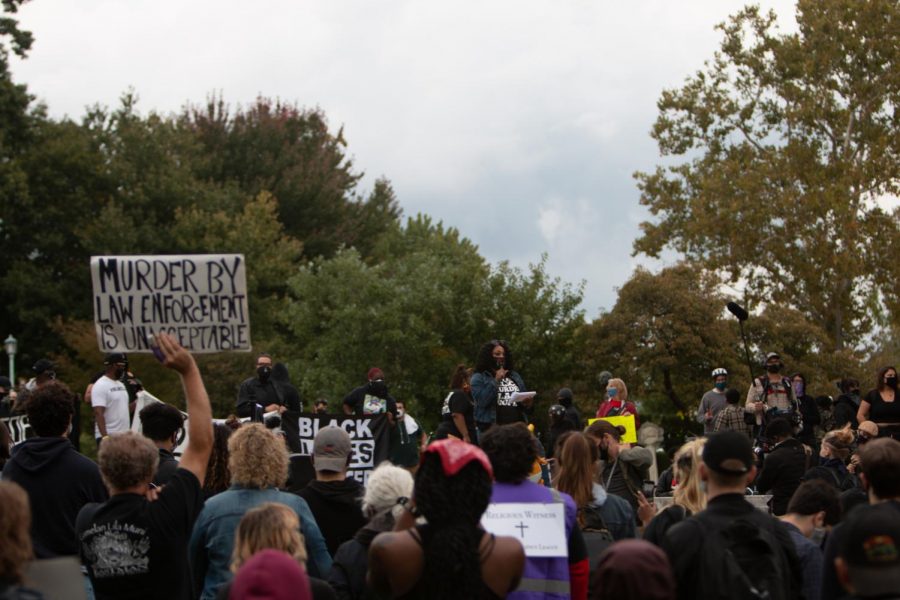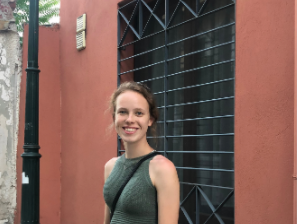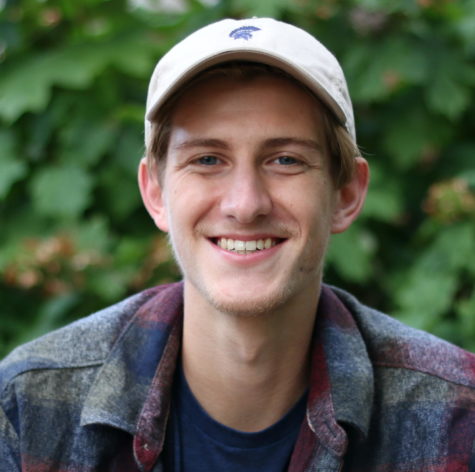Reif: Protest provided hope that was nowhere to be found in the debate
Protest at Wade Lagoon unites those who fight for justice.
October 2, 2020
There was something incredibly poetic about the setting of Tuesday’s Presidential Debate Protest for Black Lives and Climate Justice. Looking upon the crowd from Wade Lagoon, in front of all the organizers, was the Cleveland Museum of Art and its two massive banners, separated by the front entrance, reading “for the benefit of all the people forever.”
While the phrase was originally written with respect to museum accessibility, it nonetheless highlighted why hundreds of people—students, organizers, grandparents—turned out to protest the presidential debate.
Less than a mile away on the same night, two candidates would set the stage to debate their priorities and policies as presidential candidates. Little did we know, at the time, just how much of a train wreck it would be, with the time encapsulated by the three white children shouting over one another.
The debate represented a failure for our country. We have faced perhaps one of the worst years in recent history, and yet, the only candidates are a racist, misogynistic millionaire who managed to pay lower income taxes than us students and a status-quo politician who appears to have no desire to aggressively tackle climate change, healthcare or institutionalized racism.
Moreover, the debate represented a failure for our university. Case Western Reserve University agreed to host the debate in July, informing all students and faculty that it would only be beneficial publicity and not interfere with our studies. Well, those of us with in-person classes were forced to stay home and the university shut down for over 24 hours. However, more troubling, was the excessive increase in police and enforcement presence—especially after CWRU seemed so dedicated to addressing students’ concerns. This façade was corroborated throughout the night, especially when the university sent out an alert informing students of peaceful protests and marches requiring increased “law enforcement presence.” I can say, matter-of-factly, that the increased presence was not due to our protests. There were Humvees, armed police officers, National Guard and Secret Service across campus and the surrounding neighborhoods much before the protest commenced.
While the debate was largely disappointing, the protests offered a beacon of possibility. There was clear recognition that what we are doing, or perhaps what we are not doing, is not enough. Our systems and institutions are failing us, especially people of color and other vulnerable communities. They are killing us, imprisoning us and poisoning us. Speakers emphasized the atrocities of the last year––and of the last 400 years––in this country as a result of the racism embedded within our police, education and healthcare systems. Others shared imminent concerns about climate change; after all, “The Earth has a deadline,” and it’s only seven years away.
These are some of the issues that keep us awake at night. As a young person who only recently realized the urgency of these issues, they are even more frightening. We have lost the last four years, and there is genuine concern what the next few months will bring. We are living in a time that has lost all respect for democracy and political norms. The nomination of Amy Coney Barrett is but one example. And another, is the fear involved in organizing a protest.
The Presidential Debate Protest for Black Lives and Climate Justice, co-organized by Black Lives Matter Cleveland, Sunrise Cleveland, InterReligious Task Force on Central America and Black Spring Cleveland, was successful and inspiring. In a world where we feel increasingly alone, especially since the onset of the pandemic, it was empowering to know that there are hundreds of people just within our community who are organizing for a better, more equitable and sustainable future.
However, such protests come with a degree of fear and concern. These worries were exacerbated due to the nature of the debate being a national event, and for the first time, I learned just how much planning is required for organizing protests, or at least this specific one.
Beyond arranging speakers and the logistics of having those voices amplified, there must be plans for marching, evacuation routes and emergency situations. There are medics, legal observers and marshals—the people responsible for ensuring the safety and well-being of the protesters and speakers during the event, as well as de-escalating any scenarios which may arise. Even among the marshals, there were those on the perimeter, security, the bike team or running. The latter was set up in order to get important messages between marshals in case police jammed communication, a valid concern, considering past protests.
In a matter of days, I went from not knowing what “marshal” meant, to being confirmed as one for the protest. What I learned in the process, was just how little this country respects the right to protest. To be a marshal means concerning yourself with the logistics of the protest and monitoring attendees and the surroundings, rather than necessarily being fully engaged with the speakers or feeling of solidarity. Given my limited experience with protests in general, and the circulating threats of what could happen, the event brought on great anxiety for me. However, I was mildly calmed by preparation: we were exposed to some training and instructions, as well as possible scenarios that could have happened, ranging from answering people’s questions about available bathrooms to the arrival of an armed counter protester.
The entire experience only emphasized a question often floating around my head: in what kind of country do we live?
There was such concern that someone armed, or a violent counter-protester, would try to disrupt the protest or even try to harm attendees that marshals were posted around the perimeter to engage with every person who entered to ensure appropriate and safe behavior (including masks). It meant constantly being alert to the actions of everyone around me, and diverging from my common efforts to believe the best in everyone.
I was anxious and worried for hours leading up to the debate, concerned about being marked as an organizer and that I would somehow fail my responsibilities. And, I’m white. I don’t have to be as concerned about being profiled or targeted by law enforcement, for I am walking around in a world that was created to favor people who look like me.
This is the reality of our country: people are targeted for the color of their skin, the religion they practice, their sexuality or gender identity. Our first amendment right to protest is being swept away in favor of a second amendment that permits people to buy Subway sandwiches with a rocket launcher on their back. These are the priorities of our country right now.
The first step forward is ensuring that Joe Biden wins the election by a large margin so that no one can question its legitimacy. But that’s not enough. As Alexandria Ocasio-Cortez said following Ruth Bader Ginsburg’s death, “you’re not going back to brunch”—referencing many white people who protested at the women’s march in 2016 with signs saying they’d be at brunch if Hillary Clinton had won. We need a reprioritization of our values and a complete overhaul of our institutions. We need protection for protesters and the rights and safety of vulnerable communities.
When a Black person is shot seven times, it is not their fault. When a protester is targeted and killed by a car, it is not their fault. Just as there is no fault on a boy who can’t afford his insulin or a transgender person murdered for their identity. It is our fault. We have failed our society and our communities, our brothers and sisters. No one should be afraid to speak out against racism, xenophobia and hatred, while neo-Nazis freely occupy a state capital with military-grade weapons.
But it doesn’t have to end here. We unite and fight for a different, more radical future where socioeconomic status and race doesn’t determine whether you can afford healthcare, higher education or a house; where it doesn’t determine whether you have the right to live. We stand together, arm in arm—or six feet apart for now—just as we did on Tuesday.




